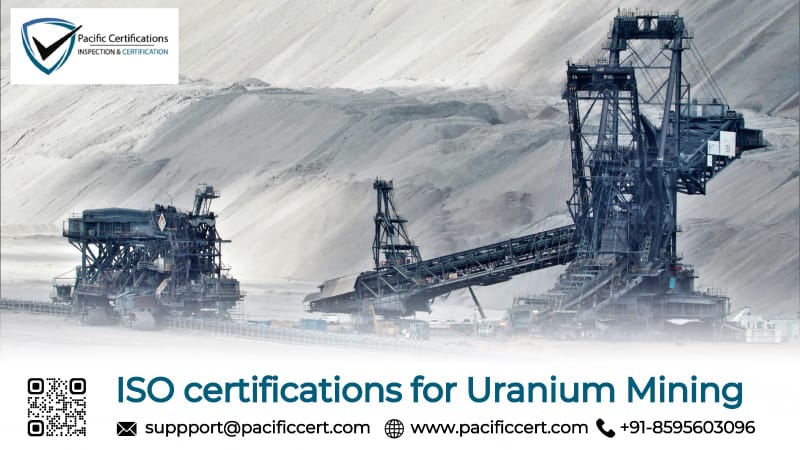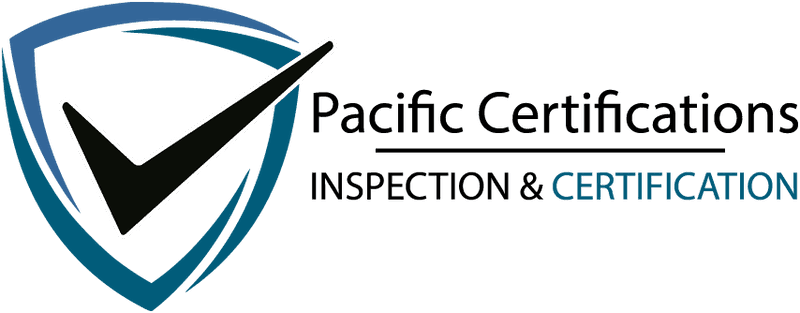ISO Certifications for Uranium Mining Sector, Requirements and Benefits

Introduction
The uranium mining sector operates under some of the most stringent regulatory, safety, and environmental controls of any extractive industry. Uranium mining activities involve exploration, extraction, processing, waste management, transportation, and site rehabilitation, all of which are closely monitored due to radiological risks, long-term environmental impact, and national and international nuclear governance requirements.
Uranium mining companies face unique challenges related to radiation exposure, radioactive waste handling, groundwater protection, occupational health, environmental remediation, and compliance with nuclear regulatory authorities. ISO certifications have therefore become an essential framework for uranium mining operators to demonstrate disciplined operational control, robust safety systems, environmental responsibility, energy and emissions management, and transparent governance across the entire mining lifecycle.
In uranium mining, safety and accountability are not optional—they define the right to operate.
For information on how we can assist your uranium mining operation with ISO certifications, please contact us at [email protected]
Quick Summary
ISO certifications provide uranium mining companies with internationally recognized frameworks to manage operational quality through ISO 9001, nuclear supply chain assurance through ISO 19443, environmental protection through ISO 14001, radiation and occupational safety through ISO 45001, asset reliability through ISO 55001, energy efficiency through ISO 50001, greenhouse gas reporting through ISO 14064, and business continuity through ISO 22301.
Together, these standards support nuclear regulatory compliance, radiological safety, environmental stewardship, asset integrity, and long-term license-to-operate in uranium extraction and processing activities.
Applicable ISO Standards for Uranium Mining
Below are the most common ISO standards applicable to uranium mining operations:
ISO 9001:2015 - Quality Management Systems
ISO 9001, quality management system, helps uranium mining businesses to ensure they meet customer and regulatory requirements consistently.
ISO 19443:2018 – Quality Management for the Nuclear Sector
ISO 19443 is the most critical industry-specific standard for uranium mining organizations involved in the nuclear fuel cycle. It builds on ISO 9001 but introduces nuclear-grade requirements related to safety culture, traceability, counterfeit prevention, supplier qualification, and risk-based thinking aligned with nuclear regulatory expectations.
ISO 14001:2015 - Environmental Management Systems
In uranium mining, ISO 14001 extends beyond conventional environmental controls to include radioactive waste management, groundwater protection, tailings stability, and long-term site remediation planning. It supports compliance with environmental permits tied to nuclear regulation and post-closure stewardship obligations.
ISO 45001:2018 - Occupational Health and Safety Management Systems
ISO 45001 plays a central role in uranium mining by addressing radiation exposure control, dose monitoring, confined space risks, dust inhalation, and remote-site operations. It supports alignment with nuclear worker safety requirements and radiation protection programs.
ISO 27001:2022 - Information Security Management Systems
ISO 27001 for information security management system is essential for uranium mining sector to protect sensitive data and ensure the confidentiality, integrity, and availability of their information assets.
ISO 50001:2018- Energy Management System
Uranium extraction and processing are energy-intensive. ISO 50001 helps operators manage energy performance in milling, pumping, ventilation, and processing facilities, supporting cost control and decarbonization goals increasingly tied to nuclear ESG frameworks.
Click here to find out more applicable standards to your industry
What are the requirements of ISO Certifications for the Uranium Mining Sector?
Uranium mining companies seeking ISO certification must establish and maintain documented policies, procedures, and records aligned with the selected ISO standards. Key requirements include the following:
ISO 9001:2015 – Quality Management Systems
Establish a documented quality management system covering mining and processing
Define operational objectives, responsibilities, and controls
Control extraction, processing, maintenance, and testing activities
Monitor performance and manage non-conformities
Implement continual improvement mechanisms
ISO 14001:2015 – Environmental Management Systems
Establish an environmental policy aligned with nuclear regulations
Identify environmental and radiological aspects and impacts
Implement controls for waste, tailings, water, and land management
Monitor environmental performance and compliance
Conduct periodic environmental reviews
ISO 45001:2018 – Occupational Health and Safety Management Systems
Establish an OH&S policy addressing radiological risks
Identify hazards related to radiation, equipment, and mining operations
Assess risks and implement preventive controls
Ensure compliance with nuclear and OH&S regulations
Monitor and improve safety performance
ISO 50001:2018 – Energy Management Systems
Establish an energy management policy
Identify significant energy uses and performance indicators
Implement energy efficiency improvement actions
Monitor and analyze energy performance
ISO 14064-1 – Greenhouse Gas Management
Define emission boundaries and sources
Quantify and document greenhouse gas emissions
Implement monitoring and reporting controls
Support third-party verification and disclosures
Tip:Start by mapping your uranium mining lifecycle—exploration, extraction, processing, waste handling, radiation monitoring, and site rehabilitation—against ISO requirements to identify compliance gaps early and align documentation with real site practices.
For further information on how we can assist your uranium mining organization with ISO certifications, contact us at [email protected].
What are the benefits of ISO Certifications for the Uranium Mining Sector?
ISO certifications are suitable for uranium exploration companies, underground and in-situ recovery operations, processing facilities, and integrated nuclear fuel suppliers. Key benefits include:
Stronger regulatory and nuclear licensing confidence, supporting approvals, renewals, and inspections.
Improved radiation safety and worker protection, reducing health risks and regulatory exposure.
Better environmental and waste management controls, particularly for tailings and groundwater protection.
Improved energy efficiency and emissions transparency, supporting ESG and climate commitments.
Enhanced investor and stakeholder trust, especially in highly scrutinized nuclear supply chains.
Greater operational resilience and continuity, ensuring stable production under strict oversight.
The uranium mining sector is subject to intense regulatory scrutiny due to nuclear safety, environmental protection, and national security considerations. Regulatory authorities require demonstrable systems for radiation control, environmental monitoring, emergency preparedness, and long-term site stewardship. At the same time, global interest in nuclear energy as a low-carbon power source has renewed attention on uranium supply chains, increasing expectations for transparent governance and responsible mining practices.
Financiers, utilities, and governments increasingly evaluate uranium suppliers based on safety records, environmental controls, emissions management, and compliance maturity. ESG-linked investment frameworks and nuclear procurement programs now emphasize verifiable management systems rather than reliance on permits alone.
Looking toward in future, ISO-aligned governance is expected to become a baseline requirement for uranium mining operators participating in international nuclear fuel markets, as certified operations consistently demonstrate stronger safety outcomes, smoother regulatory audits, and greater long-term stakeholder confidence.
How Pacific Certifications Can Help
Pacific Certifications, accredited by ABIS, acts as an independent certification body for uranium mining operations by conducting impartial audits against applicable ISO standards. Our role is to objectively assess whether documented management systems and operational practices conform to international ISO requirements, based strictly on verifiable evidence and site-level records.
We support uranium mining organizations through:
Independent certification audits conducted in accordance with ISO/IEC 17021
Practical assessment of real mining, radiation safety, and environmental controls
Clear audit reporting reflecting conformity status and certification decisions
Internationally recognized ISO certification upon successful compliance
Surveillance and recertification audits to maintain certification validity
If you need support with ISO certification for your uranium mining operations, contact us at [email protected]or +91-8595603096.
Author: Ashish
Read More at: Blogs by Pacific Certifications

